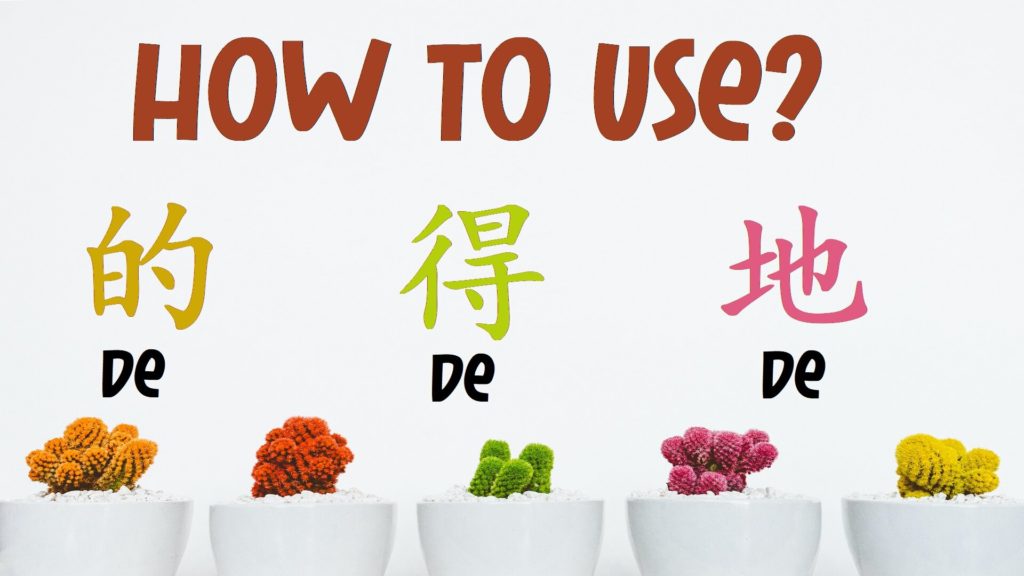Chinese structural particles DE like 的 得 地 are functional words that do not have meaning by itself but act as a linkage to glue the whole sentence together.
Chinese structural particles De can be distinguished only in written form because they have the same pronunciation. These three Chinese words are all pronounced as De.
For example,
- 你去商场买吃的东西。Nǐ qù shāng chǎng mǎi chī de dōng xī. You go to the mall to get some food.
- 轻轻地说话。qīng qīng de shuō huà. Talk quietly / softly
- 你的中文说得不错。Nǐ de zhōng wén shuō dé bù cuò. You speak Chinese rather well.

How to use 的 de ?
1. As a link
De 的 is used after a noun phrase, verb phrase or adjective phrase to link the attribute and head words together to form a phrase.
For example,
我的家 wǒ de jiā my house
红色的玫瑰 hóng sè de méi guī red roses
休息的时候 xiū xí de shí hòu during break time
2. To convert verb phrase and adjective phrase into a noun phrase or nominal
verb 吃 chī
When you add 的 after the Chinese word 吃 chī, it becomes a noun phrase such as 吃的东西 chī de dōng xī (food).
adjective 漂亮 piào liang beautiful / pretty
When adding 的 after 漂亮, it becomes a nominal phrase such as 漂亮的风景 piào liang de fēng jǐng (beautiful scenary).
3. Use 的 in between a verb-object phrase
When you insert a noun referring to people or a pronoun in between a verb-object phrase and add 的 de after that, for example, 我的 or 小明的, it is not a possessive modifier but rather it means that the person is the object of an action.
彼得爱开小明的玩笑。Bǐdé ài kāi xiǎo míng de wán xiào.
Peter loves to make fun of xiao ming.
The de in 小明的玩笑 does not mean the joke belongs to xiao ming, but rather xiao ming is the object of an action by Peter.
4. De has the meaning of etc
When you use 的 de at the end of a parallel sentence, de has the meaning of etc in English. Sometimes you add 什么 before 的 de.
过节时,妈妈新衣,新鞋的买了一大堆。Guò jié shí, mā ma xīn yī, xīn xié de mǎi le yī dà duī.
During the festive seasons, mom bought a lot new clothes, new shoes etc.
护照,钱,药什么的都带齐了吗?hù zhào, qián, yào shén me de dōu dài qí le ma?
Have you brought your passport, money, medicine, etc?
When to use 地 de?
1. When using overlapping adjectives as an adverb
他开开心心地去上课。Tā kāi kāi xīn xīn dì qù shàng kè. He went to school happily.
2. When using the Chinese idiom as an adverb
他心不在焉地听老师讲课。Tā xīn bù zài yān de tīng lǎo shī jiǎng kè. He listened to the lecture absently.
3. When using as an adverbial adjective
他热情地拥抱了我。tā rè qíng de yǒng bào le wǒ. He embraced me warmly.
他幸运地中了头奖。tā xìng yùn dì zhōng le tóu jiǎng. He was lucky enough to win the first prize.
How to use 得 de?
1. 得 is used after a verb or an adjective to link the verb, adjective or complement together to form a sentence.
你的汉语说得很好。 nǐ de hànyǔ shuō de hěn hǎo
You speak Chinese very well.
很好 is a complement (补语), 得 links the complement and verb 说 together
2. Use 得 after verb 看kàn, 吃chī, 用yòng, 说shuō, 穿 chuān to mean to be able to
这东西到底吃得吃不得?zhè dōng xī dào dǐ chī de chī bù de?
Is this thing edible or inedible?
Take note that verb +得 sentence cannot have objects after verb +得. You cannot say,
他吃得面包,我也吃得。
You should instead say,
面包他吃得,我也吃得。Miàn bāo tā chī dé, wǒ yě chī de.
He can eat bread, I too can eat bread.
3. Adding 得 after an adjective or verb has the meaning of exaggeration or something that is indescribable
看你急得!kàn nǐ jí dé! Has the meaning of why are you in such a hurry?
昨天真把我累得!Zuó tiān zhēn bǎ wǒ lèi dé yesterday was a very tiring day
For video presentation of this post, please visit our youtube channel here.
